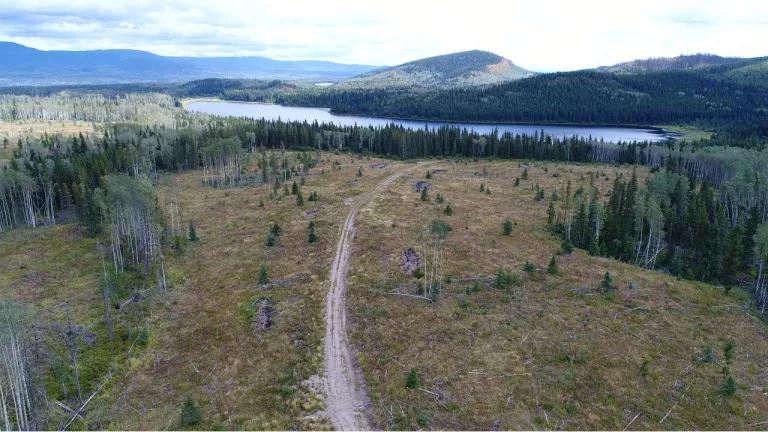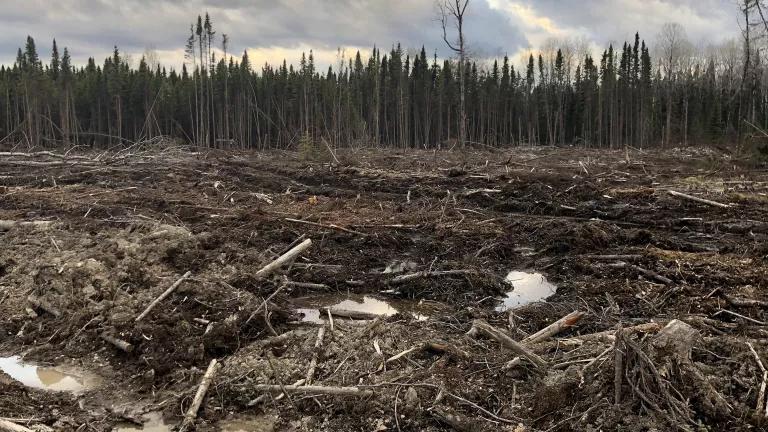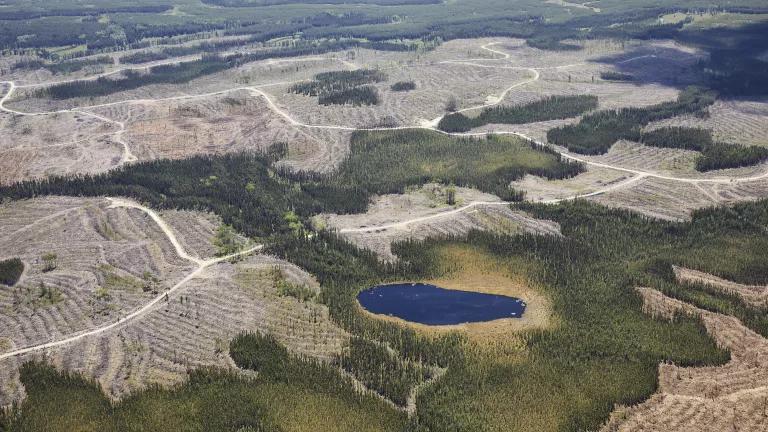Canada Is Hiding its Inaction Behind Certification
Canada has one of the world’s highest rates of logging primary forests, which are irreplaceable ancient forests that have never been industrially disturbed.

Canada's boreal forest: one of the world's most vital carbon stores
David Boutin
Canada has one of the world’s highest rates of logging primary forests, which are irreplaceable ancient forests that have never been industrially disturbed. Much of the pulp made from these forests goes into single-use tissue products like Charmin toilet paper, which is a profligate use of threatened species habitat and vital carbon stores. In an attempt to assuage public concerns, Canada often points to third-party certification of this logging, ostensibly as evidence that it is sustainable. But Canada’s claim that voluntary certification sufficiently protects forests is erroneous, and it obscures the lack of responsibility that the country is taking for long-term, enforceable forest protections. In fact, Canada’s federal and provincial governments are touting certification as a solution while they simultaneously weaken and dismantle forest safeguards. This dynamic exacerbates primary forest loss at a time when the world’s climate and biodiversity are in crisis.
Governments: Weakening Permanent Protections While Touting Certification
Canada and various provincial governments are using voluntary forestry certification as a cover for their own growing inaction on forest safeguards. Canada ranks among the top global offenders for primary forest loss, and places last among G7 countries for its land protections. No Canadian province has implemented federally-mandated forest protections for Canada’s threatened and iconic boreal caribou, leading to plummeting caribou populations. Canada’s federal government is hiding the true climate cost of widespread industrial logging, and is positioning itself to reward provinces’ rampant clearcutting of forests. The province of Ontario has permanently exempted the logging industry from the province’s own endangered species act. The province of Quebec has characterized its plans to ramp up logging as a climate solution, which is a position at odds with the urgings of scientists from around the world. Yet in the face of all this, provincial and federal governments claim that third-party certification of logging operations is evidence of the country’s strong forest protections.
While creditable certification can help to enhance the sustainability of logging operations where there is a strong regulatory regime in place, it is reckless for governments to treat certification as a replacement for legal biodiversity, climate, and human rights safeguards. Certification is voluntary, in that its protections are not permanent regulations, and its obligations are not legally binding. Companies can choose whether to pursue certifications and their associated requirements, or abandon them. They can also choose to have their operations certified by weak standards that have no meaningful environmental safeguards. As detailed here, the Sustainable Forestry Initiative (SFI), which is Canada’s most widely adopted certification, has extremely weak safeguard requirements in comparison to the well-respected Forest Stewardship Council (FSC).
Yet even FSC needs support from strong government frameworks in order to have lasting safeguards for forests. Various mechanisms within the FSC Canada framework could help move temporarily concessions toward permanent protections; some are even intended by FSC to do precisely this. Yet governments are undermining, rather than supporting, tools that could lead to lasting forest protections. For example, under the FSC system, logging companies are required to set aside the majority of intact forest landscapes (IFLs) - large connected areas of primary forest. Yet even though scientists, NGOs, and the FSC system explicitly recognize the unique and irreplaceable value of protecting IFLs, Canada’s provinces and federal governments do not. In fact, a 2021 FSC-commissioned report on IFLs highlighted that Canadian provinces’ failure to even recognize IFLs as a concept may be the largest obstacle to FSC being able to safeguard these areas. Rather than reinforcing FSC’s tools around forest safeguards, and turning these areas into long-term protections, provincial governments are actively sabotaging these efforts.
Provinces are also using certification to shirk responsibility for human rights protections that governments should be guaranteeing. This is evident, for example, in the way logging companies have very different requirements around honoring Indigenous Peoples’ right to give free, prior and informed consent (FPIC), depending on which voluntary certification a company uses. SFI’s Indigenous rights requirements are extremely weak and vague and its forest management standard shockingly does not even include the word “consent." Yet even with FSC’s detailed FPIC guidance, the harshest outcome of a company failing to secure FPIC would be losing (current or prospective) FSC-certification, which could pave the way for weaker certifications to swoop in, and would not mean that those Indigenous rights which were ignored will now be respected. More broadly, FPIC under voluntary standards is a far cry from government-to-government promises to uphold Indigenous rights. Governments should not use voluntary certification – which does not have the regulatory power to make human rights protections binding and permanent – as an excuse for their own inaction.
With Canada’s federal and provincial governments failing to protect essential protections for human rights and forests, this leaves voluntary certification alone without a meaningful regulatory backstop. Moreover, Canada’s governments neither acknowledge FSC as the country’s only rigorous certification, nor do they back its key safeguards with regulatory teeth. Meanwhile, FSC needs to compete with weak greenwashing schemes which get credit for requiring barely anything of logging companies. This creates pressure for certification systems to weaken, rather than strengthen their standards, in order to appeal to the logging companies that can choose whether to engage them. This means governments’ regulatory inaction is incentivizing a certification race to the bottom.
Forest Certification Alone Cannot Save Forests: Binding Regulatory Safeguards Are Vital
Despite the fact that they are weakening their own regulatory safeguards, Canada’s federal and provincial governments claim that forest certification proves they have sustainable logging. These governments have even pointed to certification in an attempt to stop U.S. state governments from implementing sustainability policies around boreal wood that they import. Specifically, Canadian government representatives have opposed state policies which would require that boreal logging operations respect FPIC and safeguard primary forests. It is indefensible for Canada’s governments to hide behind certification at the same time as they are weakening legal forest protections.
Canada’s federal and provincial governments need to support rather than undermine legitimate certification efforts, by implementing and enforcing permanent protections for human rights, biodiversity, and forests. This means backing and funding Indigenous-led initiatives to manage their traditional territories, safeguarding primary forests, and strengthening species protection laws. In the U.S., states and companies, as key purchasers of boreal products, should move forward and adopt strong procurement policies that protect Indigenous rights and safeguard primary forests in jurisdictions where such regulatory safeguards are lacking.
Voluntary certification under FSC can be an important tool. But FSC cannot and was never intended to serve as a substitute for legally enforceable protections that today’s beleaguered forests, biodiversity, and a warming climate urgently need.



